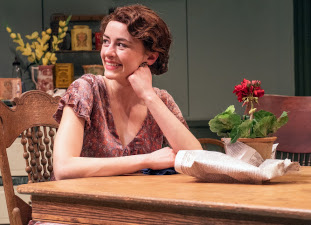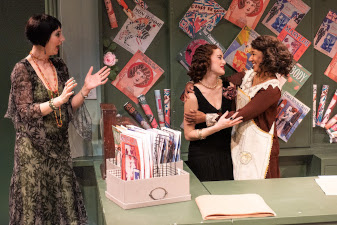
Eric
Uhlfelder
| BECOMES A WOMAN
The thrill of coming to the Mint Theater is discovering the newest “lost play” Jonathan Bank has unearthed. And the current production doesn’t disappoint. Now at the City Center in midtown, Mint is featuring Betty Smith’s first play. She wrote the famed novel A Tree Grows in Brooklyn, which turned her into a household name in the middle of the last century. "Becomes a Woman," written in 1931, earned Smith a prestigious award from the University of Michigan along with $1,000. But it was never published nor produced. The playbill suggests it was glossed over because it dealt with racy issues that were ahead of its time. That doesn’t seem quite right, but neither does having it wait 90 years for its premier. Becomes a Woman explores dichotomies and contradictions that haunt the human condition: fear and intrepidness, trust and betrayal, poverty and affluence, decency versus self-righteousness, naivety versus experience, the importance of self and the price of family. This compelling play has poignant messages. But it might’ve enhanced them. Like all Mint shows, acting, set, and lighting are first rate. And the addition of live music distinguishes it from most other Mint productions.
The play begins in the sheet music section of the local Five and Dime. Protagonist Francie Nolan (played well by Emma Pfitzer Price) sings charming contemporary tunes, accompanied on the piano by the flamboyant man-hungry Florrie (Pearl Rhein). Little do we know the lyrics set the stage for things to come. But it takes too long to get there, and this reveals the story’s uneven pacing and sequencing of events. Only substantial editing might’ve addressed this issue, but at the expense of the play’s integrity. We discover Francie’s working-class parents and siblings in the second act. Their kitchen is something out of the Honeymooners, where a plain interior is rendered with the Mint’s care for detail. But the family acts more like caricatures than real folks. Dad, Pa Nolan, is a beat cop (Jeb Brown) and Mom, Ma Nolan is a homemaker (Antoninette LaVecchia). Their dialogue tends to go in circles and is conveyed sometimes with insufficient nuance. And this is highlighted when Francie bears her struggles to them.
That event is the core of the drama--a single ordinary decision and the life-changing consequences that follow because of bias and prejudice that rips a family apart. A poignant contrast comes in the form of a tenant in the home. Performed endearingly by Gina Daniels, Tessie’s own life foreshadows things that are to come. She then helps Francie survive the trauma she has spent her whole life desperately trying to avoid. A scene in the third act, full of potential, is when Francie is visited by the father of a man she knows. Leonard Kress, senior, the owner of the store where Francie used to work, is played with compelling reserve by Duane Boutte. A more mature Francie holds her own in this encounter, which presents dramatic opportunity. It could’ve broken through the divide between the wealthy and poor. But the playwright, instead, chose to reinforce it with Kress failing to have met the moment. The way the play is structured presents challenges for any production.
Perhaps in her attempt to modernize the voicing, Britt Berke, the
youthful director, infuses the show with bits of volume and bravado.
This approach at times seems to run counter to the spirit of this
period piece that seeks to convey some important messages, which
I was more than happy to hear. |
| recordings | coupons | publications | classified |



